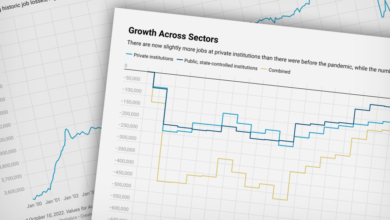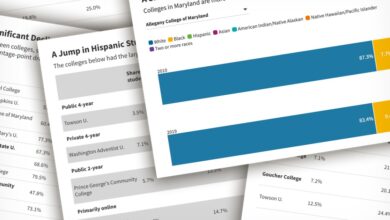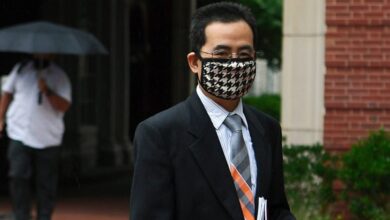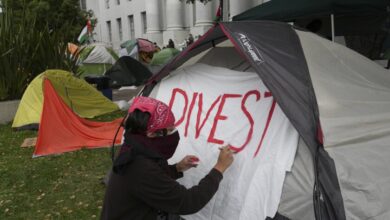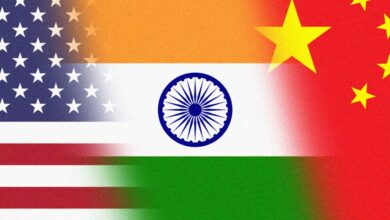Slamming the Door on Scholarship
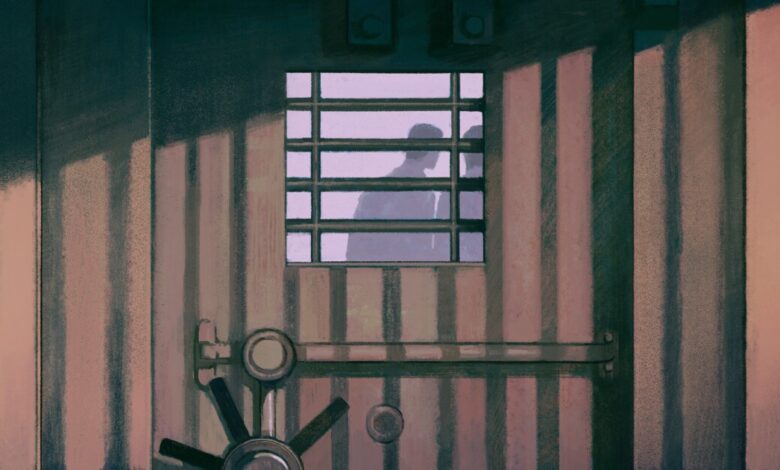
[ad_1]
But by the time Mitic, an assistant professor of higher education at the University of North Dakota, published a paper on his findings, last fall, such fieldwork was no longer feasible. Russia’s invasion of Ukraine, nearly a year ago, slammed the door on scholarship, severing international academic partnerships and making the country effectively off limits to American and other western researchers.
“It’s sort of a cautionary tale,” Mitic said. “I just don’t see that line of research continuing.”
Russia’s war on Ukraine caused an abrupt rupture. Joint projects were called off overnight, with European countries outright banning research cooperation with Russia. Russia’s government, too, announced measures to discourage international collaboration.
Russia is not the only place where on-the-ground fieldwork has become difficult, if not impossible, for outside researchers. In China, President Xi Jinping’s tightening grip on power has extended to academe. Archives have been closed to the public. Once-innocuous topics of inquiry, like trade policy or migration, have become politicized. Wariness of the West has made it more difficult for researchers to interview officials or average citizens. And Sino-American tensions, including policies put in place by the U.S. government, have further chilled scholarly exchange.
If the door has been slammed shut for researchers of Russia, it has been pulling closed, bit by bit, for those who study China. After the relative openness of recent decades, many worry that this could be a return to a time when both countries were largely closed off and academics were forced to do their work from afar.
“We’re back to being Cold War scholars,” said Jeremy S. Friedman, an associate professor at Harvard Business School who studies the history of communism and socialism in Russia, China, and the developing world.
Technology, of course, has made working with colleagues around the globe much easier than in the past, and Covid-19 put remote collaboration successfully to the test. Some even see a silver lining: If research in China and Russia is restricted, it could force academics to look for alternative sources, highlighting new perspectives and driving scholarship in fresh and potentially promising directions.
But while some work can be done at a distance, for other areas, like archival or public-opinion research, there’s no substitute for being on the ground. Without fieldwork, study of certain questions or topics could be diminished or dry up altogether.
Even with email and video conferencing, academic collaboration is rooted in personal relationships. Spending time in a location builds trust with future subjects and possible collaborators. The impact could be especially acute for graduate students and early-career scholars who haven’t had time to build professional networks. A new generation may not want to study Russia or China if it is difficult, or impossible, to go there. And an academic Cold War could isolate scholars in those countries.
The irony of the moment is not lost on scholars of China and Russia: Understanding both places is more crucial now than ever. But just as their expertise is more valued, gaining first-hand insight could become much more difficult.
“A point that’s often missed when politics get tense is that people-to-people communication is more important at these times, not less,” said James A. Millward, a professor of Chinese history at Georgetown University. “If the door is closed, we can’t hear what’s going on.”
Still, the climate for outside researchers had grown less hospitable before Covid. A 2018 survey of 500 China-focused social scientists based outside of the country asked the scholars about “repressive research experiences” they encountered in China and found that a quarter of them had been denied archival access. Five percent reported difficulty getting a visa, and nine percent said they had been “invited to tea,” that is, they had been questioned by police or other local authorities.
China has long placed restrictions on foreign scholars whose research is focused on politically sensitive issues like Taiwan or pro-democracy movements. Millward, for example, has previously been denied visas to go to China because of his work on Xinjiang, where the Chinese government has sought to repress its Uyghur Muslim minority.
We’re back to being Cold War scholars.
But China scholars said the red lines have shifted in recent years, with a widening group of subjects now likely to trip political sensitivities. Rory Truex, who conducted the 2018 survey with Sheena Chestnut Greitens, an associate professor of public affairs at the University of Texas at Austin, has seen the changes firsthand. Truex, an assistant professor of politics and international affairs at Princeton University, first went to China in 2004 as a 19-year-old Princeton undergraduate on an immersion program. He returned over the summers to teach English and learn Mandarin, and spent nearly a year on the ground conducting research for his doctoral dissertation and first book, on the Chinese legislative system. Such research “is probably not replicable today,” he said.
It used to be possible for researchers to “run around and talk to everyone,” Truex said. “I realize now that it was a relative golden era.”

Hokyoung Kim for The Chronicle
Much of the tightening coincides with the rise of Xi Jinping, who has been China’s leader since 2013. Xi, who was recently confirmed to an unprecedented third term, has sought to centralize power and silence dissent across Chinese society. But he also singled out higher education, mandating new curricula, barring the discussion of certain controversial topics in the classroom, and installing political allies as university leaders. During the pandemic, government officials put in place new regulations requiring Chinese professors to get permission before delivering academic papers at international conferences, even online.
For foreign academics, the restrictions on archival research have been one of the most visible constraints on scholarship. Without direct access, they have to rely on Chinese-published excerpts, which are often heavily redacted, said Friedman of Harvard Business School. Some individual Chinese scholars had maintained “shadow libraries” of historical materials, but doing so has become increasingly risky, with some facing house arrest.
Increasingly, foreign academics worry that they could be caught up in events not directly related to their own scholarship. In 2018, the Chinese government detained and tried for espionage two Canadians, a businessman and a former diplomat who worked for a think tank, an action seen as retaliation for the arrest of a Chinese businesswoman on fraud charges by Canadian and American authorities. Although the men were not academics, their three-year imprisonment spooked researchers who feared that they could end up in the wrong place at the wrong time.
In the wake of the incident, ChinaFile, an online magazine published by the Asia Society, surveyed contributors about whether they would travel to China once Covid restrictions were lifted. Forty percent of the respondents — who included journalists, civil-society workers, and former diplomats as well as scholars — said they probably or definitely would not.
“You can’t help but think, if it happened to him, why not me?” Meg Rithmire, an associate professor at Harvard Business School, said of the arrests. Still, Rithmire, who has two young children, said she felt safe traveling to China and hoped to do so this summer.
Indeed, the presence of foreign academics could be more problematic for their Chinese colleagues. Rithmire was one of several scholars who said if they returned to China, they would likely do so under the auspices of a foreign organization, such as the National Committee on U.S.-China Relations, rather than ask Chinese professors or universities to write invitation letters to sponsor their visits. In the current environment, hosting an American researcher could bring unwanted scrutiny to local academics, they said.
The scrutiny is not one-sided. Over the last few years, the United States government has also become more skeptical of academic collaboration with China, seeing college campuses as vulnerable to Chinese efforts to poach academic expertise and intellectual property. The Trump administration investigated and sought to prosecute American researchers who do work in China for what it characterized as academic espionage. Although the Biden administration ended the inquiry, known as the China Initiative, last year, government agencies and the U.S. Congress have continued to comb through researchers’ China ties.
Lin Zhang, an assistant professor of communications and media studies at the University of New Hampshire, said an American colleague who conducts research on China’s biotechnology industry was contacted by FBI agents who asked her, after she returned from a research trip, to share her contacts and a list of everyone she had interviewed. Though the colleague refused, some academics could pull back from working in China lest they get caught in the geopolitical crossfire. A 2021 survey of Chinese and Chinese American scientists by researchers at the University of Arizona found that a quarter would limit their connections with China, including joint research projects, speaking engagements, and visiting appointments.
While a number of policies enacted under President Donald J. Trump put restrictions on Chinese students and scholars coming to the United States, he also canceled the Fulbright program to mainland China and Hong Kong. Relatively small numbers of students and scholars study on the flagship U.S. government exchange program, but its revocation, which has not been reversed by President Biden, sends a signal about the value the U.S. government places on gaining expertise on China, scholars said.
Indeed, the number of American college students studying in China fell more than 20 percent between 2011, when President Barack Obama made a big push to send more Americans to China, and the start of the pandemic. If it becomes more difficult to spend time on the ground studying Mandarin or doing research, the pipeline of future scholars could be further depressed.
There are already efforts underway to help younger scholars if China becomes off limits. A group of China scholars, for example, has organized seminars for graduate students and early-career academics to develop strategies to research China from outside the country.
Zhang, the New Hampshire professor, had just finished up the fieldwork for her first book, on entrepreneurship and the Chinese digital economy, before Covid struck. During the pandemic, she tried to continue her research remotely, but the time differences made that difficult, and “people get tired of Zoom,” she said.
Zhang, who was born in China, plans to return this summer to see her parents and conduct some research. While she said her subject matter isn’t particularly sensitive, she expects challenges in getting people to talk with her. In the midst of a trade war, government officials and even business executives may be less open with a researcher from America.
“As someone born in China and an immigrant, I see myself as a bridge, helping explain both sides to each other,” Zhang said. “But that role is easier to play when relations are good.”
As a young academic, Zhang has to publish. So she has made a pragmatic decision: to shift the focus of her research away from China to immigrant knowledge-workers in the United States, particularly in Boston’s biomedical hub. She sees commonalities between this group and the young Chinese entrepreneurs who were her previous subjects: Both were educated overseas and must straddle two cultures.
“I’m trying to find agency. I’m trying to find value in my work,” Zhang said. “It feels natural. And it’s a decision that I made.”
“It’s a significant rupture,” said Theodore P. Gerber, a professor of sociology at the University of Wisconsin at Madison and director of its Wisconsin Russia Project. “It seems like there’s not going to be a happy ending any time soon.”
Within days of the start of the war, longstanding partnerships were past tense. The Massachusetts Institute of Technology cut ties with a Russian technological university it had helped start. The Arizona Board of Regents ordered state colleges to end all collaborative work with Russian universities. Juliet Johnson, a professor of political science at McGill University, in Montreal, was part of an international research team that had to remove a Moscow-based researcher because of European Union restrictions against funding going to Russia.
People-to-people communication is more important at these times, not less.
Still, the Association for Slavic, Eastern European, and Eurasian Studies, of which Johnson is president, issued a statement that it would not discriminate against individual researchers because of their nationality. “That was extraordinary for us because we as a rule don’t make political statements,” she said. “But we wanted to be clear about the difference between institutions and individuals.”
Even so, fieldwork in Russia has been halted. Russian flights are banned from airspace in Europe and North America, and the U.S. government has warned American citizens not to travel there. Sanctions make it nearly impossible to use credit cards or to electronically transfer money from western countries to Russian banks.
Before the war, the climate for foreign researchers in Russia had, in some ways, been moving toward greater openness, said Harvard Business School’s Friedman, who studies both China and Russia. Unlike China, Russia had been opening up its archives and declassifying more historical and government files in recent years. “On the eve of the pandemic,” Friedman said, “Russia was more accessible to researchers than it had been for 20 years.”
During the pandemic, in fact, it was possible for outside academics to do research in Russian archives. While Covid restrictions made travel difficult, archives remained open, and scholars could hire local graduate students as assistants to hunt down and copy documents. That remote-research option no longer works because of U.S. sanctions.
In other ways, however, the space for international academic collaboration was growing more restrictive in Russia. A higher-education law that took effect in April 2021 required that all joint research projects between Russian scholars and foreign colleagues get Russian government approval. Two months later, Bard College, which had longstanding Russian partnerships, was blacklisted by the Russian Prosecutor General’s Office, banned from all activity and operations in the country.
When Gerber interviewed Russian professors that summer, they spoke, although circumspectly, about concerns that government policy could further limit their work with western peers. “All the people in the academia, at least in the social sciences, have been expecting that at some point [U.S./Russia tensions are] going to hit academia and the relationship between Russian universities, scholars, and their Western counterparts,” one told Gerber.
Russian President Vladimir Putin has viewed Russian academics, particularly those with connections to the West, as potential political opponents, Gerber said.
In a paper he co-authored with Margarita Zavadskaya, a researcher at the University of Helsinki, in Finland, Gerber argues that the war could be the end of independent social science in Russia, which really only emerged after the fall of the Soviet Union. During the Cold War, the Soviet government invested in the sciences, but disciplines like political science largely didn’t exist in universities there. Collaboration with foreign academics, along with government funding, helped jumpstart these fields and raise the quality of Russian scholarship to international levels.
The disappearance of foreign research partnerships, and an exodus of professors and scientists, could hurt Russian higher education, Gerber said. “A lot of Russian scholarship will be scholarship in exile.”
Even before Russia attacked Ukraine, some Russia scholars had already begun to move the focus of their work away from Russia, motivated by limitations on academic freedom and other government policies under Putin. Johnson, for one, decided to shift her research, on financial nationalism and post-Soviet monuments, to have a broader regional focus after Russia’s invasion of Crimea, in 2014.
Johnson acknowledges that the nature of her scholarship made the transition possible, but for others it may not be so smooth. One of Johnson’s graduate students has had to completely rethink his doctoral project, which rested on focus-group research in Russia. And research that involves the discussion of sensitive political issues cannot happen over Zoom.
For Friedman, who has used archives to shed light on policy decisions, it may be possible to do research outside of Russia, mining documents in former Soviet satellites or other countries that came under Moscow’s orbit. But while those materials can provide new insights, especially about how policy-making affects such outposts, they are often one-sided. For historians and political scientists, they may shed little light on internal deliberations, he said. “It would be as if you were forced to tell the history of the United States from El Paso, Milwaukee, or Jacksonville, rather than D.C.”
The loss of on-the-ground access may be felt acutely today as academic experts try to understand Putin’s actions and motivations as he seeks to reassert Russian power. “We’ll be back to Kremlinology,” Johnson said.
Rithmire, the China scholar, notes that in-person research exposes scholars to diverse voices, challenges their assumptions, and frequently takes their work down unexpected paths. Without it, “you lose nuance,” she said.
Like Johnson, Gerber, who studies migration, has shifted his research focus away from Russia. While the work is fruitful, some collaborations may not be as deep because other countries don’t have the same expertise or research infrastructure as Russia does in the social sciences, thanks to the burst of post-Soviet investment.
There’s also the matter of language. Like other scholars of the region, Gerber speaks Russian, but doing so can be a delicate issue these days. People in Ukraine and neighboring countries have embraced their native languages as a way to assert their opposition to Moscow. Gerber is considering learning Ukrainian.
Some scholars see the current moment as an opportunity to consider what Russian studies could look like with a little less Russia. Vitaly Chernetsky, a professor of Slavic and Eurasian languages and literatures at the University of Kansas, grew up in Odessa, Ukraine, and was an exchange student in the United States when the Berlin Wall fell.
More than three decades later, Chernetsky, whose father remains in Ukraine, said scholarship of the region is still Russia-centric. Russian authors, composers, and poets are firmly established in the western canon, but those from his home country, less so. Studies of politics tend to be centered in Moscow and radiate out.
Chernetsky and others said there needs to be what they call a “decolonization” of the field. “It’s terrible it took a war to wake us up to the need for structural change,” said Chernetsky, who is the current vice president for the Association for Slavic, Eastern European, and Eurasian Studies. “We need a paradigm shift, to realize that not everything important happened in St. Petersburg or Moscow.”
Ukraine in particular has good archives, Chernetsky said, although they are now physically off limits because of the war. Efforts are underway to digitize their contents and make them more broadly available, and researchers could also work with refugee communities.
It’s time for self-examination, Chernetsky said. “How do we emerge critically richer?”
That reflection could extend to how courses on the region are taught. In a course on post-communist transformation, Johnson has assigned readings with a comparative lens, rather than a Russia focus.
Another of Johnson’s courses, on Russian politics, has 160 students this semester — and enrollment would have been higher had she not capped it. Studying Russia, and doing so in Russia, may become harder for the next generation of scholars, but the hunger for it may be growing.
For Johnson and others, the potential academic isolation of Russia and China has personal as well as professional consequences, cutting them off from a network of colleagues and friends. “I don’t anticipate being able to go back,” she said. “Maybe not ever.”
[ad_2]
Source link


